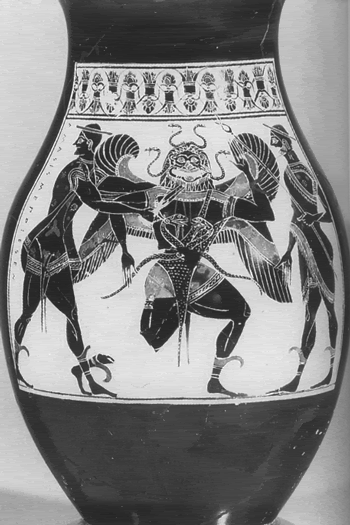Most know Perseus as the Greek hero who beheaded Medusa, one of the Gorgons whose look could turn people into stone. She was once a woman who was punished for her vanity in her looks, especially her hair: Athena punished her by turning her hair into snakes. In a certain sense, its an archetype for one who is born beautiful becomes vain in their looks, would like others to look at them, and ignores the inner development of the soul. Perseus was able to defeat Medusa by looking at her through a mirrored shield, and using that was able to cut off her head.

So what does this have to do with Napoleon, a French leader who was born many centuries after the original myth? Napoleon setup a new dynastic empire after the fall of the French monarchy: in the French Revolution, both King Louis XVI and his wife Marie Antoinette were beheaded in 1793, giving Napoleon his opportunity to rise to power afterwards:


There are differing accounts concerning how Marie Antoinette's hair had turned white: one account states that her hair turned white when the King and his family failed to flee from France at the beginning of the revolution.
But returning to the myth of Perseus: the name Perseus most probably means "destroyer". The name Napoleon means "new destroyer", derived from the Greek word Apollyon. Perseus was cast out from the mainland and grew up on the island of Seriphos, raised by a fisherman; Napoleon did not grow up on mainland France but instead was born on the island of Corsica. Later Napoleon was exiled to the island of Elba, and after that, the island of St. Helena in the Atlantic.
In order to complete his quest to kill the Gorgon, Perseus had to seek out the golden apples of Hesperides, an island far to the west. The nymphs who guarded the apples gave Perseus the location of the Gorgon Medusa. Likewise, Napoleon sold much of America to Thomas Jefferson in the Louisiana Purchase, in order to have enough money to finance his wars in Europe.
Once Perseus killed Medusa, he stopped by the Phoenician kingdom in Ethiopia and Egypt, which was ruled by King Cepheus and Queen Cassiopeia. There he rescued their daughter Andromeda, who was chained to a rock at the modern city of Jaffa as she was to be sacrificed to the sea monster Cetus. Likewise Napoleon, after he invaded Italy, set out on an expedition to Egypt, and from there laid siege to the city of Jaffa in Palestine.

Both Perseus and Napoleon were sent on a quest so that a ruler could be rid of them; both returned to defeat that ruler and to setup their own new dynasty. It is quite an odd coincidence, in how Napoleon followed the myth of Perseus: both were involved with the city of Jaffa in Palestine. Once Perseus rescued Andromeda he made her his queen; once Napoleon departed from Palestine he returned to France, overthrew the Directory, and became Emperor.
This was somewhat of an odd observation, I dont know quite what to make of it. It could be entirely coincidence. However in the ancient world there were many prophecies described in a mythological manner: many myths mention a god-man born of a virgin, who would die and then rise from the dead and ascend to the stars. Apparently the Jews were not the only ones to have recorded the prophecies of their visionaries: even in pagan myths, there are gems of truth.













Really fascinating comparison! I've always been very interested in the Perseus/Andromeda myth.
ReplyDeleteThanks for your insights.
http://www.bonzasheila.com/stories/perseusandromeda.html